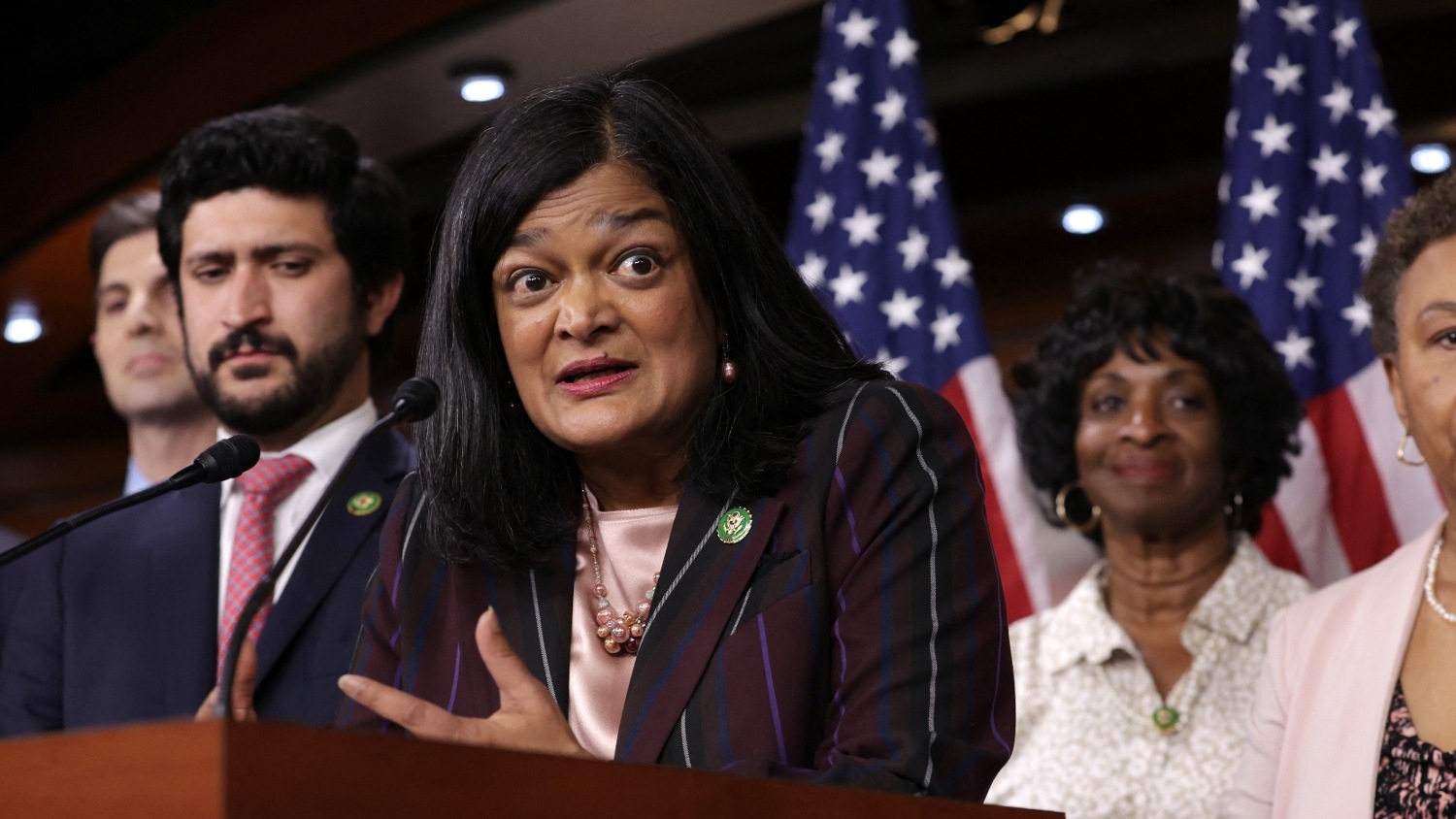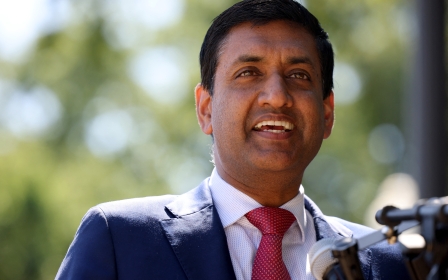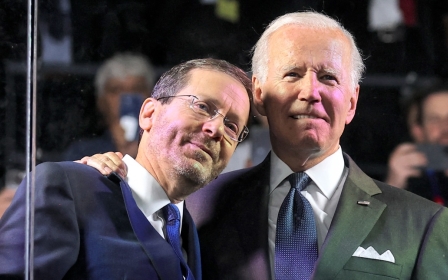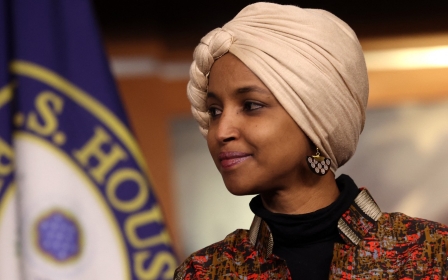'Crisis of leadership': How Democratic infighting silences criticism of Israel

In the span of just a few days, the US House of Representatives' top progressive Pramila Jayapal went from calling Israel a "racist state" to issuing an apology for doing so, to finally signing on to a House resolution that absolved Israel of racism.
The extraordinary course of events over the past week is another sign of a growing divide between the Democratic base and progressive members of Congress on the one hand, and the pro-Israel Democratic leadership who refuse to accept any criticism of Israel to enter the halls of government, on the other, Palestinian organisers and Middle East policy experts told Middle East Eye.
"The fight within the Democratic party over Israel has been simmering for a long time. I think the Jayapal statement reflects what the base knows, that Israel is a racist and apartheid state. And the party is desperately trying to suppress that sentiment," Sandra Tamari, a Palestinian-American organiser and director of the Adalah Justice Project, told Middle East Eye.
"This is a crisis for the leadership of the party. More and more constituents are saying this is untenable."
The sequence of events began in Chicago on Saturday, 15 July, when at the Netroots Conference - an annual gathering of progressive groups and organisers - Congresswomen Pramila Jayapal and Jan Schakowsky were confronted by demonstrators who were protesting against Schakowsky's lack of support for Palestinian rights, including not signing onto Congresswoman Betty McCollum's bill to protect Palestinian children.
New MEE newsletter: Jerusalem Dispatch
Sign up to get the latest insights and analysis on Israel-Palestine, alongside Turkey Unpacked and other MEE newsletters
Jayapal, the chair of the House Progressive Caucus, which has more than 100 members of Congress, stepped in to answer the protesters.
In response, the congresswoman said: "I want you to know that we have been fighting to make it clear that Israel is a racist state."
The video of her remarks quickly went viral and was shared on Twitter by the Republican National Committee as well as AIPAC, the largest pro-Israel lobbying group in the US. And with the remarks taking place just a few days before Israeli President Isaac Herzog was scheduled to give a joint address to Congress, Democrats and Republicans alike worked swiftly to disavow the comments.
Within less than a day, Jayapal issued a statement retracting her remarks and apologising.
'The backlash that we saw speaks to the fact that Zionists, both Democratic and Republican Zionists, know that they are losing'
- Lara Haddadin, US Palestinian Community Network
"Words do matter so it is important that I clarify my statement. I do not believe the idea of Israel as a nation is racist," Jayapal said on Sunday.
"I do, however, believe that Netanyahu's extreme right-wing government has engaged in discriminatory and outright racist policies."
Still, the lawmaker was condemned in a statement signed on Monday not just by Republicans, but also by more than 40 of her Democratic colleagues.
The statement also went on to equate anti-Zionists with antisemitism, aligning with the International Holocaust Remembrance Alliance definition that has been opposed by Palestinians, progressive groups and even nearly a dozen pro-Israel organisations.
A day later, the House passed a non-binding resolution claiming "Israel is not a racist state", which passed in a 412-9 vote. Jayapal voted "yes".
Middle East Eye reached out to Jayapal's office for comment, but did not receive a response by time of publication.
Lara Haddadin, a Chicago-based organiser and leading member of the US Palestinian Community Network (USPCN) who kicked off the protest at Netroots against Schakowsky, said she was disappointed but not surprised at the response to Japayal's comments.
"All allies to Palestine know that Israel is a racist state. What the representative was saying was not by any means controversial to us. It was honestly almost a basic fact about Israeli apartheid. How can an apartheid state not be racist? It is common sense to us," she told MEE.
"The backlash that we saw speaks to the fact that Zionists, both Democratic and Republican Zionists, know that they are losing."
History of Democratic party infighting
Over the past several years, some progressive members of the Democratic party have begun taking more critical stances against Israel and its treatment of Palestinians. But often those stances have come under attack from Republicans.
And rather than defending members of their party, Democratic leadership have gone on to attack these progressive lawmakers or work to isolate their views from the rest of the party.
"We know that Democrats have shown up against anyone who dares to criticise Israel," Iman Abid-Thompson, advocacy and organising director at the US Campaign for Palestinian Rights, told Middle East Eye.
One of the most prominent examples of this has been Congresswoman Ilhan Omar. Since being elected in 2018, she has faced numerous attacks for her criticism of Israel.
The Democratic congresswoman came under fire for a February 2019 tweet that said US support for Israel among politicians was "all about the Benjamins", referring to the massive Israeli lobbying presence in Washington.
Omar later apologised for her remarks, saying that she was learning about "the painful history of antisemitic tropes", but not before she was accosted by her party's leadership.
Then, later in 2019, Omar called out Washington's uncritical support of Israel, saying: "I want to talk about the political influence in this country that says it is OK for people to push for allegiance to a foreign country."
The comments led to a closed-door meeting of Democrats, a debate on how to reprimand Omar and ultimately resulted in the passage of a resolution condemning antisemitism.
Most recently, she was ousted from her position in the House Foreign Affairs Committee over her criticism of Israel - however, Democratic leaders did come to her defence this time.
Rashida Tlaib, the lone Palestinian-American woman in Congress, has also faced her fair share of attacks, both from Republicans and Democrats alike.
In November last year, Tlaib's Democratic colleague Debbie Wasserman Schultz - the former chair of the Democratic National Committee - attacked her with an accusation of antisemitism over Tlaib's remarks saying "you cannot claim to hold progressive values yet back Israel's apartheid government".
"The idea of accusing progressive Democrats of being anti-Israel and antisemitic has been proven to be an incredibly powerful weapon, not just for Republicans to use against Democrats, but to throw in and let Democrats use against other Democrats," said Lara Friedman, president of the Foundation for Middle East Peace.
"Until the Democratic party is willing to make space to legitimise a spectrum of views on Zionism and Israel, then this is always going to be a sharp-edged weapon that Republicans just throw onto the other side of the aisle and let Democrats attack each other with it."
A win for Palestinian organisers
Looking back at the past week of events, Palestinian organisers say that while Democrats were quick to reverse Jayapal's remarks, what transpired is a big win for acknowledging Israel's system of abuses against Palestinians.
"We as a movement have actually looked back at it as a political win," Abid-Thompson of the USCPR told MEE.
"There is a whole laundry list of racist policies - over 70 policies that exist to uphold this apartheid regime. So if you have almost 400 people that have to come forward and vote in support of Israel not being a racist state, then what is it that we're actually saying?"
The protest at the Netroots conference comes at a time of increasing frustration for Palestinians, who are witnessing heightened violence from Israeli military forces and settlers alike, as well as the expansion of illegal settlements in the occupied West Bank. More than 170 Palestinians have been killed this year alone.
And yet, there has been little condemnation of Israel's actions against Palestinians, with many Democrats, including US President Joe Biden, sharing concerns over the debate over Israel's judicial reforms.
"It shows the hypocrisy of the Democratic party and Democratic leaders and even these like Democratic, so-called progressive, conferences," Haddadin told MEE.
Tamari, who was on a panel at the Netroots conference the day before Jayapal and Schakowsky spoke, told Haddadin and other organisers that the only way to deal with progressives that have anti-Palestinian views is to confront them and protest.
"Jayapal didn't make that statement because she planned to, she said it because we made it an issue. We put the progressive consensus on display. We applied pressure," said Tamari.
And in addition to aligning with several international and Israeli human rights groups who have labelled Israel's treatment of Palestinians as apartheid, Jayapal's original statement calling Israel a racist state is also in line with many Democratic voters.
An April poll from the University of Maryland found that a plurality of Democratic voters who shared an opinion said that Israel is a state with segregation "similar to apartheid".
"What is apartheid but racism," Abid-Thompson said.
Another poll in March published by Gallup stated that more Democrats in the US are likely to sympathise with Palestinians than they are with Israelis.
Democrats need to 'wake up'
Since 2018, the number of progressives in Congress speaking up for Palestinian rights has slowly grown.
For example, several progressives came out to defend the statement that Israel is racist, citing that the country has been labelled as an apartheid state by numerous rights groups for its treatment of Palestinians.
'If they continue to attack people of colour, or anyone else who dare criticises Israel, they will only continue to fold in on themselves'
- Iman Abid-Thompson, US Campaign for Palestinian Rights
And the nine members of Congress who voted "no" to the House resolution stating Israel isn't racist - Jamaal Bowman, Cori Bush, Andre Carson, Summer Lee, Alexandria Ocasio-Cortez, Ilhan Omar, Ayanna Pressley, Delia Ramirez and Rashida Tlaib - are all members of the House Progressive Caucus.
A similar-sized group of Democrats boycotted Herzog's speech to Congress on Wednesday, including Jayapal and Senator Bernie Sanders.
While the number appears minute in comparison to the hundreds that were in attendance, organisers say it is a part of a growing shift in which progressive lawmakers are beginning to align more with their voter bases.
"Democrats really do need to wake up. They're not actually seeing the shift and not engaging with the shift," said Abid-Thompson.
"If they continue to attack people of colour, or anyone else who dare criticises Israel, they will only continue to fold in on themselves. "
Middle East Eye delivers independent and unrivalled coverage and analysis of the Middle East, North Africa and beyond. To learn more about republishing this content and the associated fees, please fill out this form. More about MEE can be found here.





